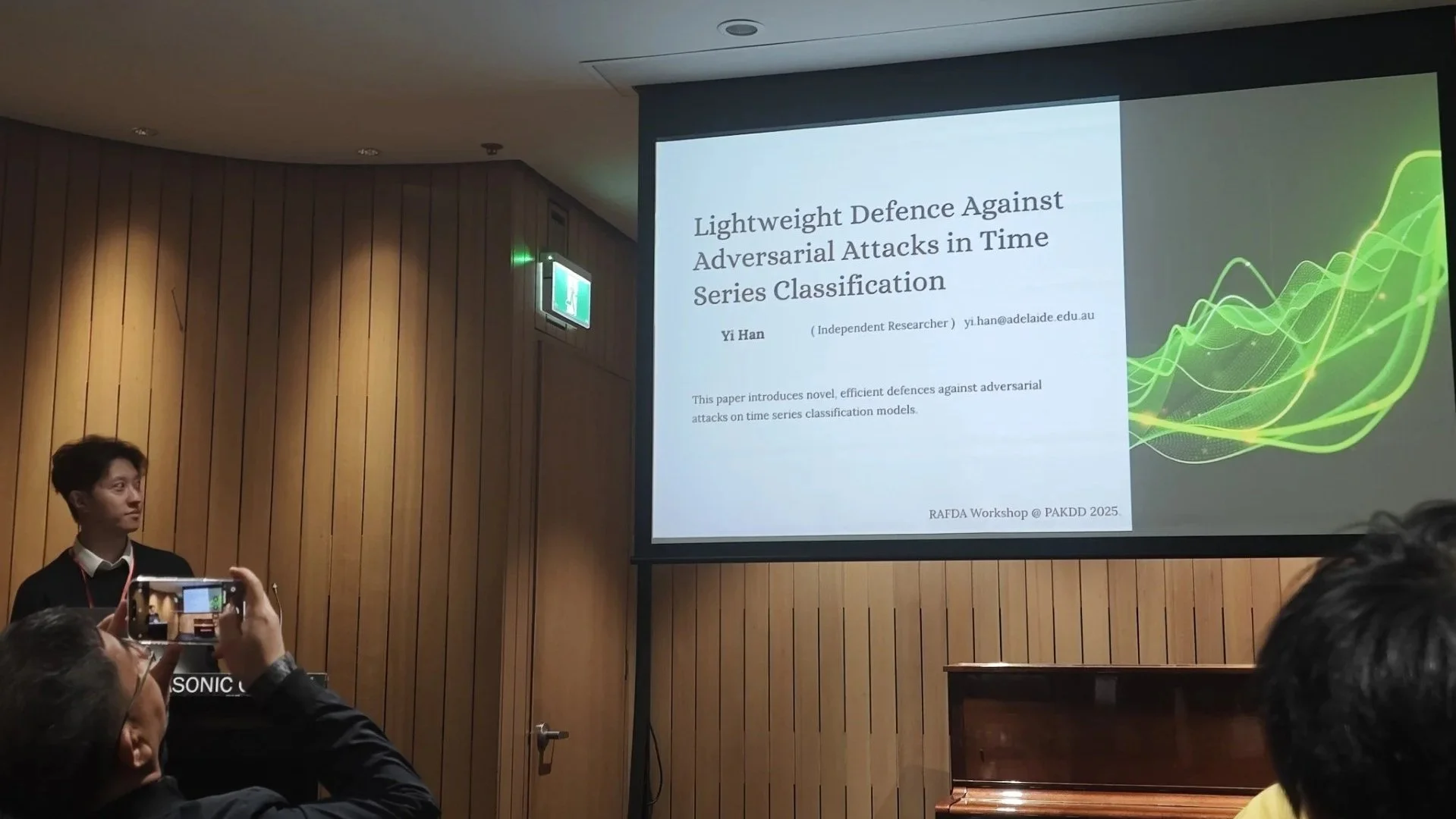Lightweight Defenses Against Adversarial Attacks: A Student’s Research in Time Series Models
This week, we are back with our student project series, where we look into some of the amazing work students have been doing. We had the chance to chat with Yi Han, who recently completed his Master’s in Data Science, about his research project. His journey is a great example of how chasing your passions can lead to exciting and unexpected opportunities.
About Yi Han
I am passionate about applying AI and data science skills to solve real-world challenges
Q: Tell us a bit about yourself and what you enjoy doing in your free time?
Hi, My name is Yi Han, and I recently graduated with a Master of Data Science from the University of Adelaide. I am passionate about applying AI and data science skills to solve real-world challenges. Outside of work and study, I enjoy traveling, table tennis, hiking, and watching films and NBA games to stay active and balanced. I also started learning salsa dancing this year in the uni!
What inspired your project?
Q: Can you briefly explain what your research project is about?
My research is about improving the robustness of time series classification models. While these models achieved high accuracy, I discovered they were highly vulnerable to adversarial attacks - changes that are malicious and almost invisible to human eyes in the input that could mislead predictions.
Q: What problems or knowledge gap inspired your project?
The state-of-the-art methods are all transferred from the Computer Vision domain and required intensive computational resources. This inspired me to shift direction and develop a lightweight defence method based on characteristics of time series data that could make models more robust in real-world scenarios such as healthcare monitoring and financial risk management. The project duration was around 4 months including finalising the paper.
I proposed a lightweight defence that boosts robustness and cuts computational cost versus adversarial training
Technical approach
Q: Can you walk me through your technical approach?
I worked with benchmark datasets from the UCR time series archive and implemented various adversarial defence techniques. Ultimately, I proposed a lightweight defence approach that significantly improved robustness while reducing computational cost compared to adversarial training on time series classification models.
Q: What is one of the challenges you face in your work?
One of the main challenges was conducting a thorough empirical analysis of my methods, which I addressed through an intensive literature review, step-by-step reasoning, and detailed calculations.
Key findings
Q: What were your key findings and the impact of your work?
The method I developed improved generalisation by 3.97% and robustness by 5.06%, while reducing computational cost by over 70%. These results show that robust models don’t always need to be resource-intensive, which is important for practical deployment in limited-resource environments.
This work has been published at PAKDD workshop 2025 and I am proud to be the sole author. I believe this work can be further extended to multimodal data and real-time monitoring systems.
I improved my communication, teamwork, time and stress handling skills.
Growth & Development
Q: How did this project help you grow or develop your skills for your career?
This project taught me how to balance academic rigor with practical application and helped me build stronger communication and time management skills. I also gained valuable experience in handling stress, meeting deadlines, and collaborating effectively with others.
Q: What would you do differently if you have more time or if you could start the project again?
If I had more time, I would conduct more comprehensive experiments and create richer visualisations, which could strengthen the work and potentially lead to publication at an even more prestigious conference.
If I were to start again, I would integrate real-world applications into the research design much earlier and use real world datasets if possible.
Stay curious & persistent
Break down problems
Manage time & communication
Embrace failure
Support each others
Believe in yourself
Advice for new Generations
Q: What advice would you give to the next generation of students?
My advice is to stay curious and persistent, especially when facing setbacks. Break problems into smaller parts, communicate openly with supervisors and peers, and manage your time carefully. Most importantly, don’t be afraid of failure - every challenge is a chance to grow.
Q: Is there anything about your journey that you would like to share?
There were lots of roadblocks along the way, some were from my learning approach, some were from the circumstances in the lab. Looking back now, I am so proud that I managed to overcome all of them and publish the paper myself!
I’m deeply grateful to everyone who supported me throughout this journey. As an international student who had no IT background before coming to Australia, I know we are under lots of pressure. So there is nothing more important than supporting each other and always believing in yourself unconditionally!
Looking into the future
Q: Where do you see yourself in the future?
In the next five years, I see myself working in data science roles, where I can apply AI and data skills to improve business and decision-making.
In ten years, I hope to grow into a leadership role that bridges technical expertise with cross-sector collaboration, driving innovation for social good.
Thank you Yi Han for the interview, and I wish you all the best in your life and career ahead.









